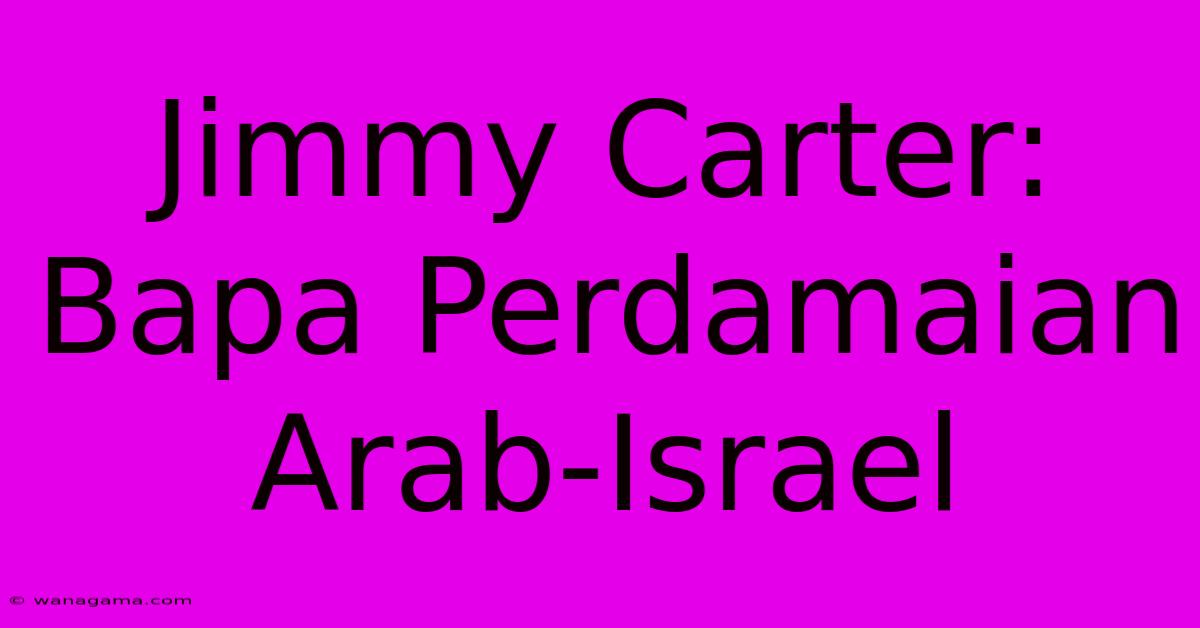Jimmy Carter: Bapa Perdamaian Arab-Israel

Discover more detailed and exciting information on our website. Click the link below to start your adventure: Visit Best Website mr.cleine.com. Don't miss out!
Table of Contents
Jimmy Carter: Bapak Perdamaian Arab-Israel? A Legacy of Diplomacy and its Limits
Jimmy Carter's presidency, though just one term, left an indelible mark on American politics. However, his post-presidency work, particularly his tireless efforts towards peace in the Middle East, has arguably become his most enduring legacy. While the label "Bapak Perdamaian Arab-Israel" (Father of Arab-Israeli Peace) might be an oversimplification, his contributions to the peace process, though complex and imperfect, are undeniable and warrant significant consideration. This article will explore Carter's role in mediating Arab-Israeli conflicts, examining both his successes and the limitations of his approach.
The Camp David Accords: A Landmark Achievement
Carter's most significant achievement in Middle East peacemaking undoubtedly remains the Camp David Accords of 1978. This landmark agreement, brokered through intense and painstaking negotiations at Camp David, brought together Egyptian President Anwar Sadat and Israeli Prime Minister Menachem Begin, two leaders with vastly different perspectives and historical grievances. The resulting accords, though not a complete resolution of the Arab-Israeli conflict, represented a major breakthrough.
Key aspects of the Camp David Accords that highlight Carter's role include:
- Creating the framework for a peace treaty: Carter expertly navigated the complex emotional and political landscape, fostering trust and understanding between Sadat and Begin. His personal involvement, including countless hours of private meetings and persuasive diplomacy, proved crucial in overcoming deep-seated mistrust.
- Facilitating direct dialogue: Before Camp David, direct communication between Egypt and Israel was almost nonexistent. Carter facilitated open and frank dialogue, enabling both leaders to address their concerns and find common ground. This direct engagement was a key element of his strategy.
- Addressing critical issues: The Accords addressed crucial issues such as the withdrawal of Israeli forces from the Sinai Peninsula and the establishment of normal relations between Egypt and Israel. Carter’s skillful negotiation ensured that both sides felt they had achieved significant concessions.
The Camp David Accords led to the Egypt-Israel Peace Treaty in 1979, a monumental event that reshaped the geopolitical landscape of the Middle East. This treaty normalized relations between two former adversaries and set a precedent for future peace negotiations.
Beyond Camp David: Carter's Continued Engagement
Carter's involvement in Middle East peacemaking did not end with Camp David. Even after leaving office, he remained deeply committed to fostering peace and reconciliation in the region. He established The Carter Center, a non-profit organization dedicated to advancing peace and human rights globally. The Center's work in the Middle East has been extensive and impactful, although frequently controversial.
Post-presidency efforts included:
- Mediation efforts in other conflicts: Carter attempted to mediate in other conflicts within the region, although with varying degrees of success. His efforts often involved quiet diplomacy, shuttle diplomacy, and persistent engagement with regional leaders.
- Promoting dialogue and understanding: Carter consistently advocated for dialogue and understanding between conflicting parties. He stressed the importance of addressing underlying grievances and building trust.
- Advocacy for Palestinian rights: Carter has been a vocal advocate for Palestinian rights, often criticizing Israeli policies in the occupied territories. This stance has earned him both praise and criticism, highlighting the complexity of the peace process and the lack of universally accepted solutions.
Criticisms and Limitations: A Nuanced Perspective
While Carter's efforts are widely lauded, his approach has also faced significant criticism.
- Accusations of bias: Some critics have accused Carter of being overly sympathetic to the Palestinian cause, at the expense of Israeli security concerns. This perception has hindered his ability to act as a truly neutral mediator in some instances.
- Limited success beyond Camp David: While the Camp David Accords stand as a testament to his diplomatic skills, his subsequent efforts to achieve a comprehensive peace settlement have had limited success. The Israeli-Palestinian conflict remains largely unresolved.
- Ignoring regional complexities: Critics argue that Carter sometimes oversimplified the complexities of the conflict, overlooking the role of other regional actors and power dynamics.
The Enduring Legacy: Inspiring Future Efforts
Despite the criticisms and limitations, Carter's legacy in Middle East peacemaking remains significant. He demonstrated the potential of persistent diplomacy and personal engagement in resolving seemingly intractable conflicts. The Camp David Accords remain a powerful example of what can be achieved through skillful negotiation and a commitment to peace.
His post-presidency work, though not always successful in achieving immediate breakthroughs, has kept the issue of Middle East peace on the international agenda. His unwavering dedication to peace and human rights continues to inspire other peacemakers and activists around the world. While the title "Bapak Perdamaian Arab-Israel" may be a simplification of his multifaceted role, his contributions are undeniable, prompting continued reflection on the complexities of peacebuilding and the challenges of achieving lasting resolution in deeply entrenched conflicts. The ongoing struggle for peace in the Middle East serves as a constant reminder of the challenges ahead, but Carter's legacy provides a valuable model for future efforts. His commitment to dialogue, understanding, and persistent engagement remains a beacon of hope in a region desperately needing lasting peace.

Thank you for visiting our website wich cover about Jimmy Carter: Bapa Perdamaian Arab-Israel. We hope the information provided has been useful to you. Feel free to contact us if you have any questions or need further assistance. See you next time and dont miss to bookmark.
Also read the following articles
| Article Title | Date |
|---|---|
| Liverpool Hancurkan West Ham 5 0 | Dec 30, 2024 |
| Siaran Langsung Bola Sepak West Ham Vs Liverpool | Dec 30, 2024 |
| Tonton Juventus Vs Fiorentina Kemungkinan Pemain And Lokasi | Dec 30, 2024 |
| Live Blog West Ham Lawan Liverpool | Dec 30, 2024 |
| Salah Cemerlang Liverpool Hancurkan West Ham | Dec 30, 2024 |
